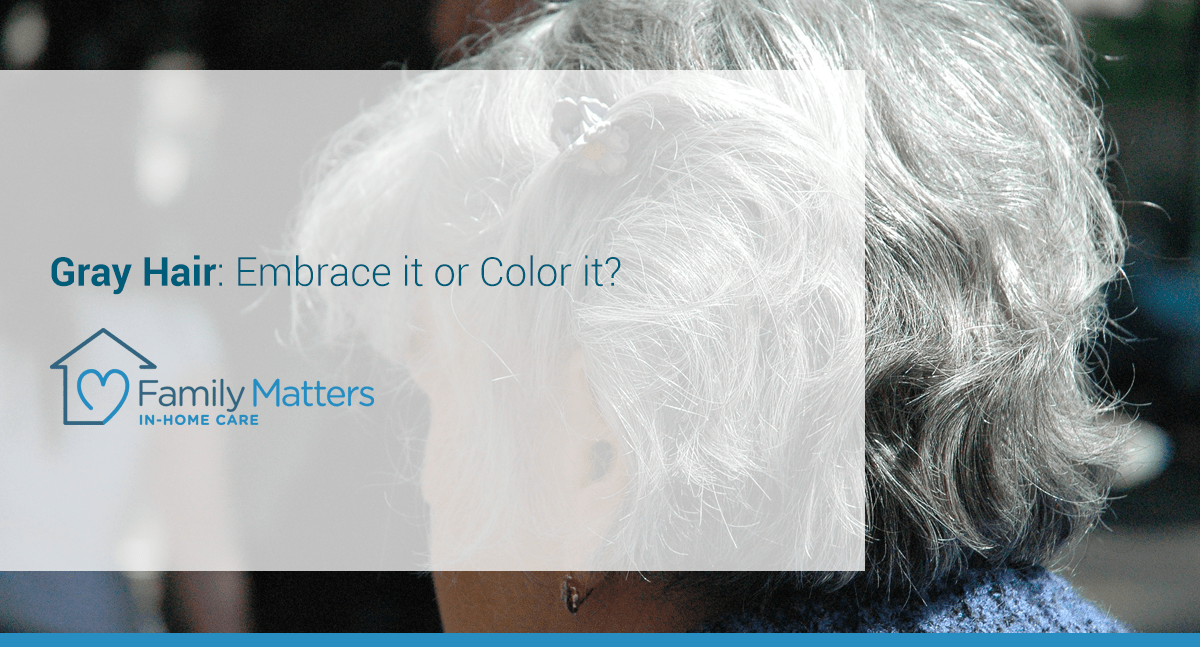
Gray Hair: Embrace it or Color it?
There are those who don’t worry when gray hair begins to appear and others who can’t bear to see one gray strand. Believe it or not, after the age of 30 your risk of going gray increases 10 to 20 percent every decade. It’s not really a matter of if you will go gray, but when. The question is, what will you do when that happens? Will you color your hair or let it go naturally gray? It’s a very personal decision.
Hair turns gray when the hair follicles stop producing the pigment called melanin. It’s the same type of pigment that gives our skin and eyes their color. However, once the hair stops producing melanin it never begins again. Once the melanin is gone, every hair that grows out of that follicle will always be gray.
Causes of Gray Hair
The age at which melanin stops producing hair color pigment is genetic. If your parents were prematurely gray, chances are you will be too. Contrary to popular belief, stress does not cause gray hair.
Smoking contributes to gray hair. In fact, some studies have shown that smokers were two and a half times more likely to have gray hair before the age of 30 than non-smokers. Smoking can also make gray hair take on a yellowish hue.
Some health conditions can cause gray hair:
- Autoimmune diseases like Vitiligo that destroys cells in the scalp that make melanin
- Lack of vitamin B12
- Thyroid disorders
- Rare tumor conditions
- Alopecia areata causes patchy hair loss, remaining hair may be gray and may regrow as gray or white
Caring for Gray Hair
The truth is that gray hair is different – and more temperamental. It’s thinner than hair with pigment and that may make it more difficult to style. Gray hair also does not have as much protection against the sun and styling chemicals so it may become dry, stiff and sometimes course in texture. Gray hair is also more resistant to hair dyes. One could say that gray hair is like a temperamental child – it does what it wants, when it wants. However, there are many ways to control it.
Controlling Gray Hair
Styling: First, visit a hair stylist and discuss your hair with them. A professional hairdresser is educated as to the physical properties of gray hair. He or she will examine your hair and the way it grows, then suggest a cut and conditioning that will make your hair look the best. The hairdresser can also style it in a way that accommodates the particular properties of gray hair to make it more manageable.
- Frizzing: If you find that your gray hair is frizzy and out of control, try using over the counter oils and deep moisturizing treatments. These will combat dryness and dullness. Also, look for shampoos made specifically for gray hair- they often have a purple hue and will add shine to the hair.
- Dying: If you choose to dye your own hair, permanent dyes will last longer and cover better than semi-permanent dyes. If you find that your gray hair does not hold the dye, slowly transition to a lighter color that will allow the gray hair to blend in with the dyed color. You can also get it professionally dyed at a hair salon.
- Go natural: If you decide to let your hair go naturally gray, make sure to keep it well conditioned. Ask your hairdresser to help you transition to fully gray hair using opaque demi color and highlights. It will help to blend the grays as they grow in.
Whether or not you decide to go naturally gray is up to you. Either way, keeping your hair well styled and conditioned is the key to maintaining healthy, good looking hair as you age.
If you or your family member is considering in-home care as part of a plan to age in place, contact Family Matters In-Home Care today for a free consultation. Our team is dedicated to supporting your family and helping older adults enjoy life in the comfort of their own home for as long as possible.
Some of the services offered by Family Matter In-Home Care include: Alzheimer’s & Dementia Care, Bed & Wheelchair Transfer Assistance, Companionship, Housekeeping & Meal Preparation, Personal Care, Recovery Care, and Transportation.
Serving the San Francisco Bay Area and Greater San Diego, Family Matter In-Home Care has offices throughout California including: Campbell, CA, Roseville, CA, San Marcos, CA, and San Mateo, CA.
